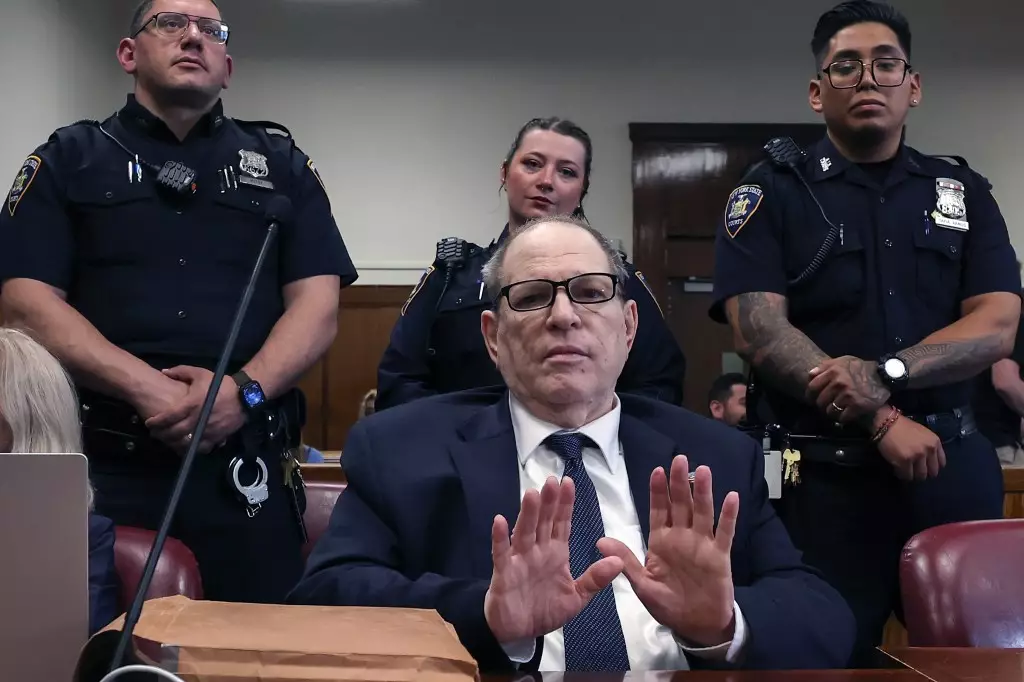As Harvey Weinstein’s retrial unfolds in New York, the air is thick with a paradox that tugs at the very fabric of our legal system and societal values. With headlines chronicling the downfall of a once-invincible titan in Hollywood, we are reminded of a time when power and influence seemed insurmountable. Yet here lies Weinstein, cloaked in the shadows of his own making, fraught with allegations that extend well beyond mere accusations. This retrial raises crucial questions: Does our justice system sufficiently hold such high-profile individuals accountable, or does it instead perpetuate a circus of ambiguity that allows them to evade complete responsibility?
The decision of Weinstein’s legal team to keep him off the witness stand is telling. They claim it’s driven by a “cautious” instinct rather than a desire to evade difficult scrutiny. But when a defendant decides to forgo their opportunity to address the jury, one cannot help but question their confidence in the evidence presented. One could argue that an unequivocal denial of guilt could serve to bolster his image, staving off the public’s growing mistrust. Instead, he opts for a strategy that smacks of strategic reticence, leaving a void that whispers of guilt rather than innocence.
The Scent of a PR Maneuver
While Weinstein remains silent in the courtroom, he is anything but silent in the court of public opinion. His jailhouse interview with Candace Owens presents an alarming glimpse into a strategy that seems more a carefully orchestrated public relations campaign than a legitimate engagement with justice. In claiming to be wrongfully accused, Weinstein appears to lean on an alleged moral high ground rather than confronting the far more severe implications of his actions. This calculated narrative, encapsulated by phrases such as “justice must know the difference between moral and illegal,” raises eyebrows regarding his understanding of the gravity of sexual assault—a distinction lost on many who have suffered under his alleged predatory behavior.
This juxtaposition of his defenses illustrates a broader cultural trend since the #MeToo movement galvanized the public consciousness in 2017. Weinstein’s legal representatives attempt to position him as a victim of circumstance, framing interactions with his accusers as consensual “friends with benefits” arrangements. This is not just a legal strategy; it reflects an insidious attempt to expand the definition of consent and accountability in a way that may diminish the very real narratives of those who came forward. The language he utilizes is not merely an attempt to recast the events in his favor; it’s an effort to normalize the exploitation that became synonymous with his lifestyle.
The Weight of Past Convictions
The irony cannot be ignored: Harvey Weinstein, once the subject of adoration and envy, now contemplates a future likely imprisoned for the rest of his life, compounded by the relentless justice unfolding against him in multiple jurisdictions. Having already served a considerable sentence for his crimes, this retrial poses the very real possibility of retribution long sought by his accusers. Yet, the addition of charges and changes in his legal representation reveal cracks in the foundation of his once-impenetrable fortress.
In navigating this intricate labyrinth of the court system, Weinstein’s team enjoys the privileges of a well-connected defense. This blend of insider influence and legal maneuvering highlights another disturbing layer to this saga: the extent to which wealth and privilege can mold the trajectory of legal proceedings. With a new judge presiding over this retrial, one is left to wonder if true justice can ever genuinely be administered when the scales are tipped in favor of the affluent.
Weinstein’s fight is not simply a battle for his freedom; it embodies a broader struggle between societal expectations and the stark reality of power dynamics intertwined with sexual violence. Each step taken in the case reverberates through an increasingly aware public that demands accountability and change. In the echoes of the courtroom, we find ourselves at a pivotal juncture in which the concepts of justice and morality are inextricably linked, and the need for equity in the legal process has never felt more pressing.

Leave a Reply